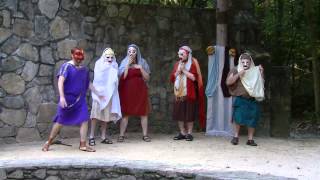S. James reflects on success of Roman Comedy Institute
During the summer of 2012, Sharon L. James co-directed the National Endowment for the Humanities Summer Institute on Roman Comedy in Performance. With the help of visiting faculty consultants, she and co-director Tim Moore, PhD ’86, lead 25 participants through the rough and tumble world of Roman Comedy. Together they created multiple performance versions of scenes from Plautus and Terence by experimenting with staging, actors, translation, choreography, and more. By doing so, they crafted an excellent series of videos that relates the ancient plays to our modern society. Below, Prof. James recounts the pains and gains of the institute.
Sharon L. James
co-director

I came up with the idea for this institute when I began to have trouble explaining to students just how Plautine jokes about slave torture might have been funny to the Romans, or how the many rape plots in Roman comedy would have been received by audiences. These plays are rarely staged, largely because those elements are so disturbing. A National Endowment for the Humanities Institute that experimented with different ways of staging scenes from Roman comedy seemed the ideal way to explore such issues.
I was very fortunate that alumnus Tim Moore, PhD ’86, liked the idea and agreed to co-direct the institute — I certainly could not have pulled this program off without him, and I think we made a great team. We spent a couple of years planning, and submitted our proposal in March 2011. Rather to our surprise, it was approved, so we were in business six months later, and I found myself arranging for costumes, masks, and more.
It was an enormous amount of work, but a tremendous success. The visiting faculty experts were enthusiastic and inspiring. Our participants were dedicated, creative, energetic. They hurled themselves into performance, often literally hurling themselves around the stage. The Latin performances are very musical because they learned the intricate meters of Roman Comedy in Tim’s many workshops.
So far, the YouTube videos have been seen more than 5,500 times, in 73 countries outside the U.S. (The Latin scenes are especially popular internationally.) I learned a great deal from this program—much more than I had expected—about construction of scenes, circumstances of performance, and options for modern performances. It was an amazing experience.
I would like to express my thanks to the department chairs, Cecil Wooten and James Rives, who were very supportive of the Institute, and to our wonderful office staff — Kim, Karna, and Cinnamon. We could not have done it without you!